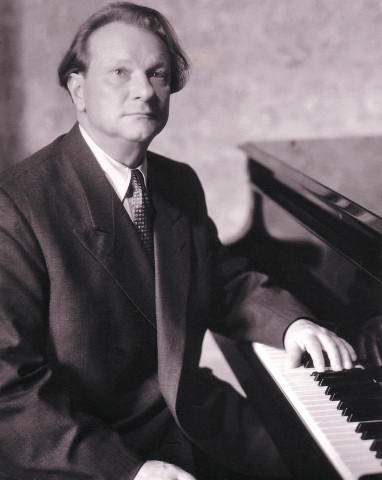
Jānis Ivanovs
(09.10.1906 - 27.03.1983 )
“...more persistently, with more conviction, form your main idea in art – without this, an artist is nothing and his creative work – a barren flower that people do not need, because this does not thrill them. If this great idea is found and understood, then also one can expand the boundaries of the form, expand the tonal harmonic system, search for new forms of musical syntax, make a wider use of polytonalism and rhythm, which have now gained unique rights in the formation of the musical image... It is all good and necessary if the idea asks for it and if the idea is truly constricted by the old academic forms... Senseless formalism and art are two things that cannot be connected. This is because there, where a juggling with form begins, thought is extinguished. But without an idea there is form... and there is no art...”
Jānis Ivanovs (An Address for the Young, 1968)
“The courageousness of his musical language leaves him without peer in our music.”
(Jēkabs Vītoliņš)
“Yes, truly! The music of Jānis Ivanovs is always a battle with something – something that bothers, something that delays, something that stands in the way. Jānis Ivanovs is like lightning and the thunder that periodically cleans the air with its luciferistic sounds. It seems to me that his symphonies are like antique Greek tragedies with their purifying catharsis... The dearest to me is Jānis Ivanovs’ natural disposition to harmonic lucidity, which, to him, has never become banal or epigonic. That is perhaps because it has a large intellectual and emotional charge.”
(Marģeris Zariņš)
“The goal, for him, was not to be modern and stylish at all costs. There had to be a reason for innovations. The 20th century brought global changes to humanity as a whole, and also to the composer’s place of birth, changes that were specific, tangible, and painful to the core. Time had moved forward tempestuously and relentlessly, which is why the music also had to change. As a frivolous comparison, the modernism in Ivanovs’ music is not spicy fare to be placed on top of a sandwich, but the yeast of change is for Ivanovs in the bread itself. Even at the end of his life Ivanovs stayed true to the modern creative philosophy, not only in terms of upgrading composition tools in step with the times, but also at the broadest conceptual level.” (Imants Zemzaris)
The author of 21 symphonies, several concerti and symphonic poems, Ivanovs has gone into history as the most noteworthy Latvian symphonic composer of the second half of the 20th century. Jānis Ivanovs (1906, Preiļi – 1983, Riga) graduated from Georg Schnéevoigt’s conducting class in 1931 and Jāzeps Vītols’ composition class in 1933 at the Latvian Conservatory.
From 1944 to his death in 1983, he taught composition and orchestration there (today the Latvian Academy of Music). In the 1930s, Ivanovs worked as a sound engineer, later (1944–1961) as the artistic director of Latvian Radio.
Already in the 1930s, Jānis Ivanovs had developed a highly individual style, rooted in a synthesis of late romanticism, folklore, and impressionism. With the music of Ivanovs, a new level of clear, constructive form and precision entered Latvian symphonic music, which excluded expressive approximation and passiveness. His works gained a new dimension of dramaticism and monumentalism in the decades following WWII under the influence of expressionism and neo-classicism. His 4th and 5th Symphonies were attacked for being musically formalistic and denounced during the infamous 1948 campaign of the Zhdanov aesthetic. When the intensity of ideological manipulation thawed somewhat after the death of Stalin, Jānis Ivanovs was gradually able to recapture the depth of psychological expression he had attained earlier, in his 7th (1953) and especially his 8th Symphony (1956). After his Piano Concerto (1959), beginning with his 9th Symphony and continuing up to his 21st Symphony (1983, completed and orchestrated by Juris Karlsons), Ivanovs’ symphonic music became decidedly more dramatic, monumental, even philosophic, although the dramatic elements therein are individualized in each work. The dramatic aspects of his symphonies are multi-layered.
One is defined by the eternal artistic concept “the individual vs. mankind”. It is associated with a strong will, self-proclamation, and an energetic struggle, as well as the pain of loss and resignation. But alongside this psychological layer there is also a second dramatic element, which portrays conflicts of the external world. The disguising of these two dramatic spheres and the motion from one to the other is one of the most characteristic idiosyncrasies in the symphonic music of Jānis Ivanovs. Ivanovs’ complete symphonic works are being released by the British recording company Campion.
Arnolds Klotiņš
